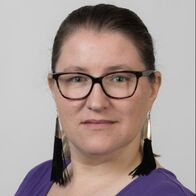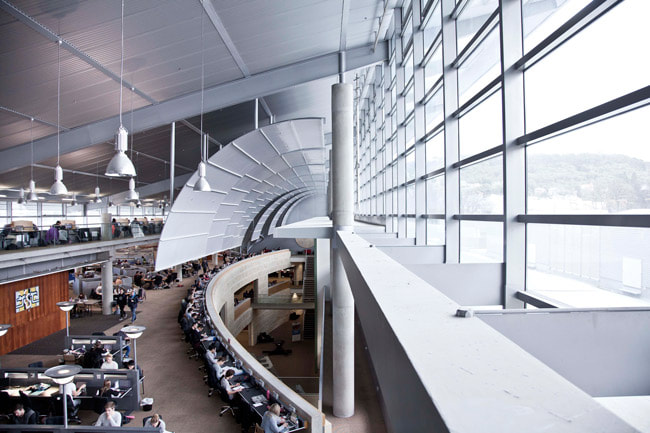Shiobhan Smith

Shiobhan Smith is the Associate University Librarian for Customer Experience at the University of Otago, and we feature her career in this issue of Library Life Te Rau Ora.
TELL US A BIT ABOUT YOURSELF
Kia ora, Dia ghuit. I am a proud Ōtepoti girl, born in Mosgiel on the Taieri plains. As my Gaelic name suggests, my ancestry is mainly from Ireland, my father’s family being West Coast O’Donnell’s. In my youth I was a competitive highland dancer. As well as many provincial, island, and New Zealand championships, this has left me with two very “dodgy” Achilles tendons. I continue to support both highland dancing and solo bagpiping as the president of the Otago Centre of the Piping and Dancing Association of New Zealand.
I attended the University of Otago to complete degrees in history, with honours, and teaching. I then had a spell working at the Otago Museum, before moving into libraries and completing a Master of Library and Information Studies through Victoria University of Wellington. I completed my master’s while working fulltime, having two children and looking back, I think I must have been mad!
My first library position was working as a library assistant at the Bill Robertson Library. At the time it was the joint library for the Dunedin Teachers College and the Otago Polytechnic. The University of Otago Library gained me as part of the merger between the Teacher’s College and the University in 2007. Very early on I realised that I loved working as a librarian and this, rather than teaching in a high school, was to be my career.
So, I have taken every opportunity to advance my skills and knowledge, whether through training, research, or taking on new positions. As such, since the merge in 2007, I have been fortunate to work as a subject librarian, a research services librarian, and until recently the manager of the library’s research support unit. In June of 2022, I began my current role and joined the library’s executive management team.
TELL US A BIT ABOUT YOURSELF
Kia ora, Dia ghuit. I am a proud Ōtepoti girl, born in Mosgiel on the Taieri plains. As my Gaelic name suggests, my ancestry is mainly from Ireland, my father’s family being West Coast O’Donnell’s. In my youth I was a competitive highland dancer. As well as many provincial, island, and New Zealand championships, this has left me with two very “dodgy” Achilles tendons. I continue to support both highland dancing and solo bagpiping as the president of the Otago Centre of the Piping and Dancing Association of New Zealand.
I attended the University of Otago to complete degrees in history, with honours, and teaching. I then had a spell working at the Otago Museum, before moving into libraries and completing a Master of Library and Information Studies through Victoria University of Wellington. I completed my master’s while working fulltime, having two children and looking back, I think I must have been mad!
My first library position was working as a library assistant at the Bill Robertson Library. At the time it was the joint library for the Dunedin Teachers College and the Otago Polytechnic. The University of Otago Library gained me as part of the merger between the Teacher’s College and the University in 2007. Very early on I realised that I loved working as a librarian and this, rather than teaching in a high school, was to be my career.
So, I have taken every opportunity to advance my skills and knowledge, whether through training, research, or taking on new positions. As such, since the merge in 2007, I have been fortunate to work as a subject librarian, a research services librarian, and until recently the manager of the library’s research support unit. In June of 2022, I began my current role and joined the library’s executive management team.
WHAT DOES A TYPICAL DAY LOOK LIKE IN YOUR ROLE?
here is no typical day. About the only consistent task is answering email communications. Broadly speaking, however, my role involves a mixture of research, networking, planning, people management, and documentation. With the rest of the executive team, I spend a significant amount of my time thinking and working on strategy. There is also significant time dedicated to financial and human resource matters. A current project I am working on is developing a customer experience values framework for the library. This has involved reading literature, talking to stakeholders, surveying library staff, running focus groups, completing project documentation, and consulting with various subject matter experts.
WE ALL HAD AN IDEA OF WHAT A LIBRARIAN IS OR DOES WHEN WE WERE YOUNGER, WHAT WAS YOURS?
am dyslexic. As a child, I struggled to read and for me, libraries were never inviting places. I was lucky to have good friends as a teenager who introduced me to various fantasy and science fiction authors and that was the point I learned to read for pleasure. Even still, up until I started working in a library, I never realised how much it suited me or just how diverse a career in libraries can be.
here is no typical day. About the only consistent task is answering email communications. Broadly speaking, however, my role involves a mixture of research, networking, planning, people management, and documentation. With the rest of the executive team, I spend a significant amount of my time thinking and working on strategy. There is also significant time dedicated to financial and human resource matters. A current project I am working on is developing a customer experience values framework for the library. This has involved reading literature, talking to stakeholders, surveying library staff, running focus groups, completing project documentation, and consulting with various subject matter experts.
WE ALL HAD AN IDEA OF WHAT A LIBRARIAN IS OR DOES WHEN WE WERE YOUNGER, WHAT WAS YOURS?
am dyslexic. As a child, I struggled to read and for me, libraries were never inviting places. I was lucky to have good friends as a teenager who introduced me to various fantasy and science fiction authors and that was the point I learned to read for pleasure. Even still, up until I started working in a library, I never realised how much it suited me or just how diverse a career in libraries can be.
ANY CAREER HIGHLIGHTS YOU’D LIKE TO SHARE WITH US?
Managing the Research Support Unit has definitely been a highlight. The unit was practically brand new when I became its manager, and it didn’t have a firm identity or direction at that point. The University of Otago also undertook a major support services review and the library lost much of its in-house dedicated information technology support. I pulled together a fantastic group of librarians and began the process of building the unit’s reputation in supporting open access and the institutional repository, bibliometrics, publishing, research data management, and eResearch. The unit got involved in library and data carpentry and digital humanities. My experience of running the unit inspired me to produce a capability framework and eventually, I aim to complete a PhD examining the professional identity of librarians supporting this type of mahi.
DO YOU HAVE ANY ADVICE FOR THOSE WHO ARE CURRENTLY FINISHING THEIR LIS QUALIFICATION/ DEGREE? Network. Connect with people. Attend conferences, go to training opportunities, share with professionals, and engage with your users. Be open to new ideas and new methodologies. Find yourself a mentor and listen to their wisdom. It takes a village to raise a child and a library community to grow a librarian. He aha te mea nui o te ao? He tangata, he tangata, he tangata.
Managing the Research Support Unit has definitely been a highlight. The unit was practically brand new when I became its manager, and it didn’t have a firm identity or direction at that point. The University of Otago also undertook a major support services review and the library lost much of its in-house dedicated information technology support. I pulled together a fantastic group of librarians and began the process of building the unit’s reputation in supporting open access and the institutional repository, bibliometrics, publishing, research data management, and eResearch. The unit got involved in library and data carpentry and digital humanities. My experience of running the unit inspired me to produce a capability framework and eventually, I aim to complete a PhD examining the professional identity of librarians supporting this type of mahi.
DO YOU HAVE ANY ADVICE FOR THOSE WHO ARE CURRENTLY FINISHING THEIR LIS QUALIFICATION/ DEGREE? Network. Connect with people. Attend conferences, go to training opportunities, share with professionals, and engage with your users. Be open to new ideas and new methodologies. Find yourself a mentor and listen to their wisdom. It takes a village to raise a child and a library community to grow a librarian. He aha te mea nui o te ao? He tangata, he tangata, he tangata.
WHO OR WHAT WOULD YOU SAY IS ONE OF THE BIGGEST INFLUENCES ON YOUR CAREER TO DATE?
I have firmly come to believe that my neurodivergent mind has been a major influence on my career. My big picture, visual brain has supported me to succeed in areas such as exploring opportunities and problem-solving. I have been fortunate to have some great managers who saw my strengths and provided the conditions for me to be successful. Recently retired librarian Sue Weddell helped me build my confidence as a professional and fellow executive manager. Cate Bardwell has always been a model of how to lead with respect and trust.
IF YOU COULD RECOMMEND ONLY ONE BOOK (SITE OR RESOURCE) TO SOMEONE, WHAT WOULD IT BE?
Aaron Tay’s blog “Musings about librarianship”. He is one of the most switched-on librarian commentators for topics like open access, open data, discovery layers, and bibliometrics.
HOW WOULD YOU LIKE TO SEE LIBRARIES AND INFORMATION SERVICES LOOK LIKE IN THE FUTURE?
Libraries of the future should be led by and reflect their communities. Some things already happening that make me excited for the future include, reparative metadata projects, innovative use of spaces that bring the digital and physical together, use of UX methodologies to engage with users, and projects by libraries to support “open” whether that is getting research out from behind a paywall, or digitization programmes that make unique and special collections more accessible. I think diversifying our workforce will continue to be important. Our workforce should and must mirror our communities.
I have firmly come to believe that my neurodivergent mind has been a major influence on my career. My big picture, visual brain has supported me to succeed in areas such as exploring opportunities and problem-solving. I have been fortunate to have some great managers who saw my strengths and provided the conditions for me to be successful. Recently retired librarian Sue Weddell helped me build my confidence as a professional and fellow executive manager. Cate Bardwell has always been a model of how to lead with respect and trust.
IF YOU COULD RECOMMEND ONLY ONE BOOK (SITE OR RESOURCE) TO SOMEONE, WHAT WOULD IT BE?
Aaron Tay’s blog “Musings about librarianship”. He is one of the most switched-on librarian commentators for topics like open access, open data, discovery layers, and bibliometrics.
HOW WOULD YOU LIKE TO SEE LIBRARIES AND INFORMATION SERVICES LOOK LIKE IN THE FUTURE?
Libraries of the future should be led by and reflect their communities. Some things already happening that make me excited for the future include, reparative metadata projects, innovative use of spaces that bring the digital and physical together, use of UX methodologies to engage with users, and projects by libraries to support “open” whether that is getting research out from behind a paywall, or digitization programmes that make unique and special collections more accessible. I think diversifying our workforce will continue to be important. Our workforce should and must mirror our communities.

